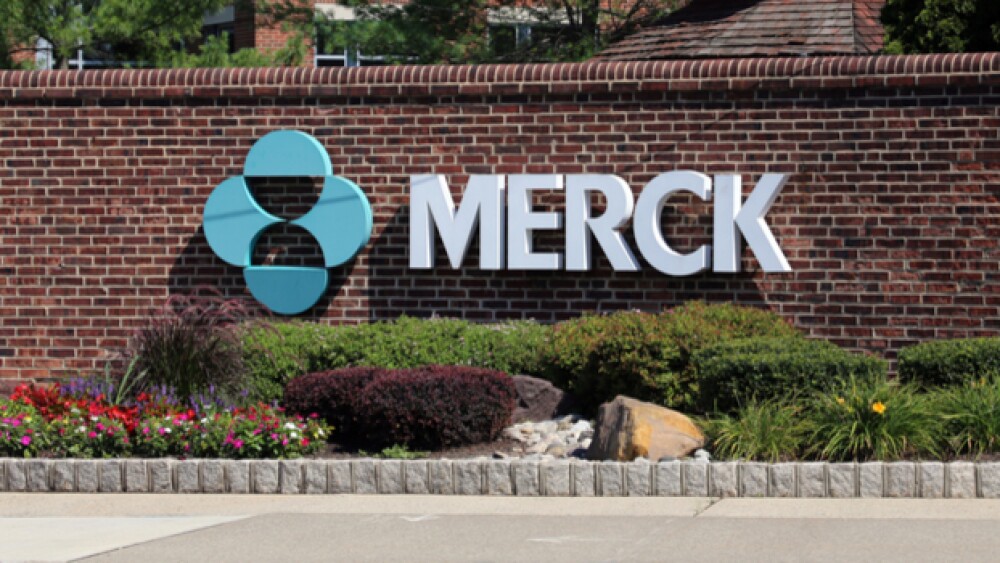Merck is having a very busy week. Here’s today’s news.
Katherine Welles/Shutterstock
Merck is having a very busy week. Here’s today’s news.
The U.S. Food and Drug Administration (FDA) issued a Complete Response Letter (CRL) to Merck for its supplemental Biologics License Application (sBLA) for Keytruda (pembrolizumab) in high-risk early-stage triple-negative breast cancer (TNBC). This isn’t a surprise.
On February 9, 2021, the FDA’s Oncologic Drugs Advisory Committee met to discuss the submission and essentially indicated they didn’t believe the drug was ready to be approved for this indication. The 10 cancer experts voted unanimously that the company should wait for longer-term data from KEYTRUDA-522 before asking the FDA to approve it in these settings. Merck states that the next interim analysis is “calendar-driven” and will happen in the third quarter of this year.
The sBLA was specifically looking for approval for the company’s blockbuster checkpoint inhibitor Keytruda for TNBC patients in combination with chemotherapy as pre-operative treatment and then as a single agent as post-operative treatment. Merck has said they are reviewing the letter and will work with the FDA on its next steps.
The submission was based on pCR data and early interim event-free survival (EFS) results from the Phase III KEYNOTE-522 trial, which is ongoing to evaluate for EFS.
Merck also announced today that the Committee for Medicinal Products for Human Use (CHMP) of the European Medicines Agency (EMA) has recommended Keytruda as a monotherapy and in combination with chemotherapy for the first-line treatment of certain patients with advanced or metastatic urothelial carcinoma. The drug is approved in Europe for adults with advanced or metastatic urothelial carcinoma who are not eligible for cisplatin-containing chemotherapy and whose tumors express PD-L1 with a Combined Positive Score of 10 or greater.
This approval was based on a single-arm study, KEYNOTE-052. KEYNOTE-361 was run as part of a post-marketing deal after the initial approval of Keytruda for these patients.
KEYNOTE-361 failed to hit its primary endpoints of progression-free survival (PFS) and overall survival (OS) for the Keytruda plus chemotherapy combination. However, the CHMP decided that the benefit-risk profile was worthwhile and that by including data from KEYNOTE-361 in the label, doctors can determine the benefit-risk of Keytruda on an individual basis.
“Keytruda has become an important treatment option for certain patients with locally advanced or metastatic bladder cancer in the European Union and other countries around the world,” said Scot Ebbinghaus, vice president, clinical research, Merck Research Laboratories. “We are pleased with today’s positive opinion by the CHMP, which fulfills our post-marketing requirement for Keytruda in these patients in the European Union and will enable continued access for patients in need of another treatment option.”
And finally, Merck and Alydia Health entered into a definitive agreement. After Merck spins off Organon, Organon will acquire Alydia Health. Alydia is a commercial-stage medical device company focused on preventing maternal morbidity and mortality caused by postpartum hemorrhage (PPH) or abnormal postpartum uterine bleeding. PPH is one of the most common birth complications, causing drug treatment in up to 10% of mothers, and can potentially results in emergency interventions like hysterectomy and blood transfusions, and in some cases, maternal death.
The deal will happen after Organon has spun off as a standalone publicly-traded company.
“The acquisition aligns with Organon’s strategy to become a global leader in women’s health by focusing our product development on her unmet medical needs,” said Kevin Ali, chief executive officer of Organon. “We believe that Organon’s strong global commercial footprint in reproductive health, in conjunction with Alydia’s rapidly growing commercial capabilities in the U.S., will help enable growth of the Jada System, including potential expansion into Europe and other developed countries, as well as in the world’s least developed markets where Organon has significant experience creating affordable access.”
Organon will acquire Alydia for $240 million, including $215 million upfront and a $25 million contingent milestone payment. $50 million of the upfront payment will be paid before the Organon spinoff, $165 million at the close, and the rest after hitting the milestone. The spinoff is currently expected late in the second quarter of this year.





